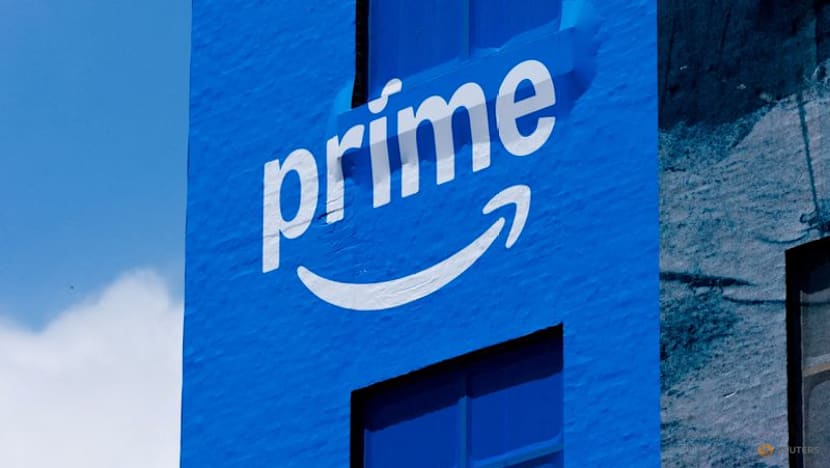Amazon to pay $2.5 billion for allegedly duping millions to sign up for Prime

FILE PHOTO: A downtown building is wrapped in Amazon Prime advertising ahead of Comic-Con International, in San Diego, California, U.S. July 22, 2025. REUTERS/Mike Blake/File Photo
Amazon.com will pay $2.5 billion in fines and reimbursements to Prime subscribers to settle the Federal Trade Commission's allegations that it deceived its customers to generate subscriptions, the FTC said on Thursday.
While a win for consumers and the FTC, the settlement is relatively painless for Amazon: the company takes in around $2.5 billion in sales every 33 hours. Shares of Amazon were nearly unchanged after the news.
Around 35 million Prime customers will be eligible for payout from a $1.5 billion fund, the FTC said. Amazon will pay $1 billion in fines to the FTC. The company did not admit wrongdoing as part of the settlement.
Customers who signed up for Prime between June 23, 2019 and June 23, 2025 through certain offers - and who used few Prime benefits afterward - will automatically receive $51, according to court documents.
The settlement also allows customers to submit claims for payment if they tried to cancel Prime and failed during that time.
Amazon said in a statement that the deal allows it to move forward and focus on customers.
"We work incredibly hard to make it clear and simple for customers to both sign up or cancel their Prime membership, and to offer substantial value for our many millions of loyal Prime members around the world," the company said.
As part of the settlement, Amazon has agreed to create a "clear and conspicuous" button to allow customers to decline a Prime subscription, and to make it easier to cancel. Amazon has also agreed to more clearly disclose the terms of a subscription during enrollment and pay an independent supervisor to monitor compliance.
Amazon said the settlement largely requires it to maintain changes that are already in place, rather than make new ones.
The FTC alleged in its case that, between 2017 and 2022, Amazon executives rejected changes that would make its sign-up and cancellation processes clearer. The company later adopted changes in 2022, while it was under investigation by the FTC. The agency sued Amazon the next year.
FTC'S SECOND-BIGGEST CONSUMER PAYOUT
The settlement is the second-largest restitution amount ever for an FTC action, agency officials said, and represents a major win for the FTC's tough-on-tech agenda, which began during the first Trump administration.
FTC Chair Andrew Ferguson called the deal "a record-breaking, monumental win for the millions of Americans who are tired of deceptive subscriptions that feel impossible to cancel."
The FTC announced the settlement days into a trial in Seattle federal court, where the agency argued to a jury that Amazon sought to enroll members whether or not they wanted the service.
The FTC said its investigation showed Amazon executives and employees discussed enrollment and cancellation with comments like “subscription driving is a bit of a shady world” and leading consumers to unwanted subscriptions is “an unspoken cancer.”
The settlement lets Amazon avoid further public airing of the FTC's claims that Amazon executives knew its sign-up and cancellation methods confused customers.
Lina Khan, the former FTC chair who filed the case, called the $2.5 billion settlement "a drop in the bucket for Amazon and, no doubt, a big relief for the executives who knowingly harmed their customers," in a post on social media site X.
The FTC started probing Amazon's subscription practices during President Donald Trump's first term and the case was filed during Joe Biden's presidency.
SETTLEMENT UNLIKELY TO HURT PRIME'S MARKET DOMINANCE
Amazon founder Jeff Bezos once said he wanted to make Prime so compelling that consumers would feel they are "being irresponsible" if they are not members. Amazon introduced Prime in 2005 for $79 per year and has steadily increased subscription fees, most recently to $139 in 2022. The program helped drive $23.9 billion in subscription revenue in the first half of 2025, making it a key growth driver for the company.
Amazon drove those recruits, the FTC said, by offering free trials on its website using pitches such as: "Get FREE Same-Day Delivery." But the FTC said Amazon had failed to clearly disclose to customers that selecting that option would enroll them in Prime and eventually result in monthly subscription charges.
While Amazon has agreed to change some of its practices as part of the settlement, investors do not believe those changes will dent Prime's appeal.
"Amazon may have made Prime easier to cancel, but the program remains deeply entrenched in most American households," said eMarketer analyst Zak Stambor.













